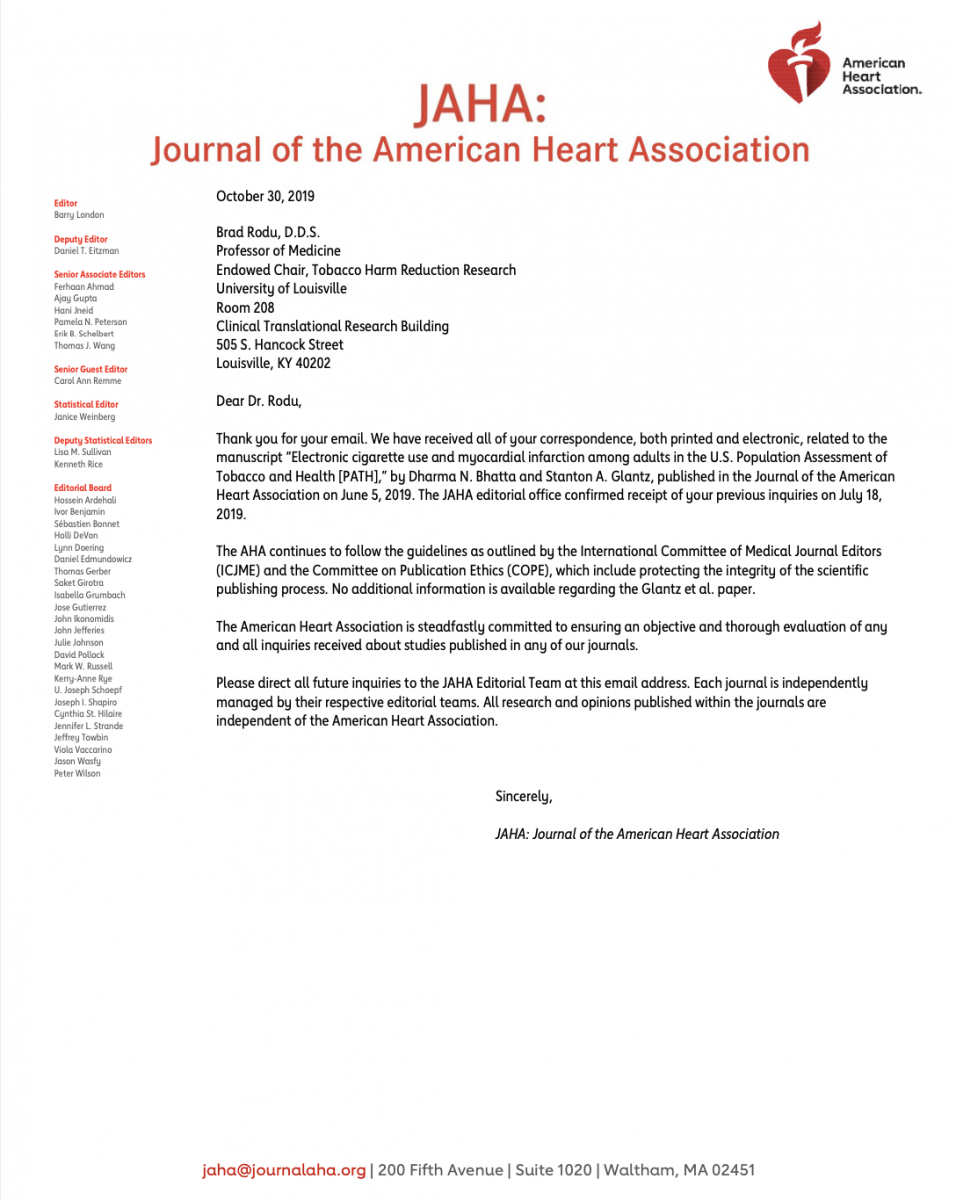The study, conducted by Stanton Glantz and Dharma Bhatta, drew swift rebuke for its use of data. The headline finding was quickly embraced by the unquestioning media, but genuine experts could see the glaring flaws.
Brad Rodu, Professor of Medicine at the University of Louisville and endowed chair in tobacco harm reduction research, obtained the data Glatz and Bhatta used and discovered that from the 38 patients, most had experienced their heart attack before taking up vaping.
Despite repeated contact and letters, the Journal is still failing to take direct action. Advocate Clive Bates recently said: “The Journal of the American Heart Association risks becoming the object of satire over its failure to address the fatal flaws in this paper.”
Eight months on from its publication, Bates adds: “There is no ambiguity about the problems with the paper and no argument to delay its removal from the published literature. One has to ask the question: if not this, then what would cause JAHA to retract a paper that was so obviously unreliable?”
The only action it has taken so far is to publish an update, as: “The authors had not properly obtained permission from the Inter‐university Consortium for Political and Social Research”.

In his online blog, Brad Rodu now says the editors of the Journal, “have refused to correct demonstrably false research results published in the June issue.”
Worse, “the journal editors never responded to me in a substantive manner. In October, the journal sent me an unresponsive letter about COPE guidelines. The letter was unsigned, a discourtesy suggesting that the editors found our objections unworthy of consideration.”
Sixteen respected professionals wrote to express their concerns:
- critical failures in the published paper itself;
- the conduct of the authors in failing to make adjustments to their analysis with data they knew were available that would have addressed the problems with their analysis, though doing so would have undermined their original conclusion;
- the process followed by the journal in the light of the whistleblower complaint made by Dr Brad Rodu in July 2019 and now followed up by us.
They asked: “Does the journal accept the findings are unreliable and what does the journal propose to do about the published paper? Can you confirm whether there is or has been an investigation into this complaint, outline its current status and set out the outcome of the investigation if there is one so far?”
Brad Rodu calls out the work, and the efforts of the Journal of the American Heart Association’s editors as “academic misfeasance”.
The American Heart Association has been waging a war on vaping and leaves facts and evidence at the door time and time again. In 2017, it issued an example of this in a press release, within which it made a fantastical claim that, “e-cigarettes may pose the same or higher risk of stroke severity as tobacco smoke”. [link]
Professor Michael Siegel commented that the American Heart Association was demonstrating a “blatant disregard for the truth”, which was “not only unscientific but it is also damaging to public health.”
Snopes, “the internet’s definitive fact-checking resource”, called out the AHA for misleading the public about coconut oil [link]. It accused the public health body of “cherry-picking data” to “misrepresent the very science they claim to be defending”.
It seems the American Heart Association and its publication are content to continue this corrupt approach to evidence and facts with Glantz and Bhatta’s study. The researchers have been caught out as grossly inept or as outright liars, there is zero justification for “Electronic Cigarette Use and Myocardial Infarction Among Adults in the US Population Assessment of Tobacco and Health” to continue to be a published paper.
Related:
- “Indefensible Inaction by JAHA Editors on Obvious Research Misconduct” by Brad Rodu – [link]
- “Electronic Cigarette Use and Myocardial Infarction Among Adults in the US Population Assessment of Tobacco and Health” – [link]
Dave Cross
Journalist at POTVDave is a freelance writer; with articles on music, motorbikes, football, pop-science, vaping and tobacco harm reduction in Sounds, Melody Maker, UBG, AWoL, Bike, When Saturday Comes, Vape News Magazine, and syndicated across the Johnston Press group. He was published in an anthology of “Greatest Football Writing”, but still believes this was a mistake. Dave contributes sketches to comedy shows and used to co-host a radio sketch show. He’s worked with numerous start-ups to develop content for their websites.
Join the discussion
Harm Reduction For The Rich
The United Kingdom risks becoming a harm reduction country only for the wealthy, according to Michael Landl of the World Vapers’ Alliance
CAPHRA Highlights Tobacco Control Flaws
The Coalition of Asia Pacific Tobacco Harm Reduction Advocates highlights the flaws in tobacco control which has led to the rise of black market in Australia
A Missed Opportunity at COP10
The Smoke Free Sweden movement says that COP10 was a missed opportunity to save millions of lives
COP10: Promote Tobacco Harm Reduction
Experts with Smoke Free Sweden are emphasising the urgent need for a Tobacco Harm Reduction approach at COP10






-listing400.jpg)




